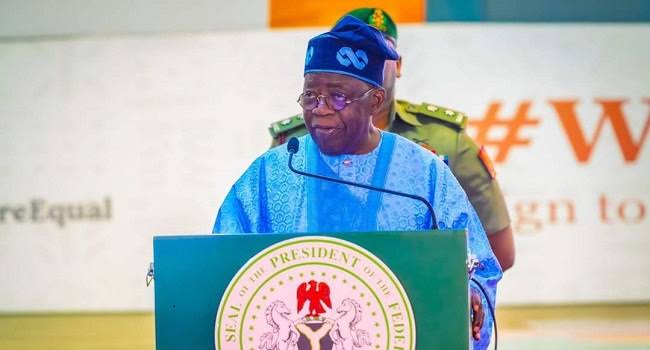In a deeply symbolic gesture that ties past sacrifices to present aspirations, President Bola Ahmed Tinubu on Thursday conferred national honours on dozens of Nigerians, many of them posthumously, as part of the Democracy Day celebration. Announced during his State of the Nation address at the National Assembly, the gesture reflects a deliberate attempt to acknowledge the contributions of both celebrated and unsung heroes in Nigeria’s long and turbulent journey toward democratic governance.
The honours, spanning across several decades of activism, advocacy, journalism, politics, and human rights work, include names etched deeply into Nigeria’s democratic memory. From Kudirat Abiola, assassinated in 1996 while campaigning for the actualisation of her husband MKO Abiola’s presidential mandate, to Nobel laureate Prof. Wole Soyinka, who has remained a moral compass in Nigeria’s intellectual and political discourse, the list is as expansive as it is symbolic.
Kudirat Abiola was posthumously awarded the title of Commander of the Federal Republic (CFR), a move that many see as a long-overdue recognition. Perhaps more tellingly, Shehu Musa Yar’Adua, a former Chief of Staff, Supreme Headquarters and prominent pro-democracy voice, was honoured posthumously with the Grand Commander of the Federal Republic (GCFR), Nigeria’s highest national title. Soyinka was conferred with the Grand Commander of the Order of the Niger (GCON), affirming his role not just as a literary icon but a national conscience.
The posthumous recognition of Ken Saro-Wiwa and other members of the Ogoni Nine, including Barinem Kiobel, Baribor Bera, Nordu Eawo, Saturday Dobee, and others, marks a bold political and historical statement. These men were executed by the Sani Abacha regime in 1995 for their activism against environmental degradation by oil companies in the Niger Delta. Their recognition signals an official rehabilitation of their memory, one many consider long overdue.
“I shall also be exercising my powers under the prerogative of mercy to grant these national heroes a full pardon, together with others whose names shall be announced later in conjunction with the National Council of State,” President Tinubu said. This unprecedented move may set the stage for a broader historical reconciliation and rehabilitation of individuals and groups previously criminalized for standing up against authoritarianism.
Equally striking is the inclusion of media and civil society veterans such as Dapo Olorunyomi, Kunle Ajibade, Nosa Igiebor, Bayo Onanuga, Ayo Obe, and Odia Ofeimun, among others. These are figures whose work in journalism and human rights advocacy helped sustain democratic discourse during Nigeria’s darkest days of military rule.
The honours also cut across political divides and ideological spectrums. From socialists like Dr. Edwin Madunagu to conservative figures like Mobolaji Akinyemi; from civil rights stalwarts like Femi Falana (SAN) and Bishop Matthew Hassan Kukah to government officials such as Dr. Tunji Alausa and Hon. Labaran Maku — the broad-based recognition suggests a deliberate effort to present a unifying narrative of national struggle and sacrifice.
Critics might argue that honours alone cannot undo years of historical neglect and injustice. However, this act of state recognition, especially when accompanied by a presidential pardon, can serve as a starting point for national healing and historical redress. It acknowledges the fractures in Nigeria’s past and, more importantly, signals a willingness to reframe the nation’s democratic journey in a more inclusive and truthful light.
In the broader scheme, this gesture fits into President Tinubu’s long-standing identity as a pro-democracy figure, a man who himself was hounded into exile during the Abacha years. By using his presidency to canonise many of those who fought or died for Nigeria’s democracy, he asserts both political continuity and moral obligation.
Still, the practical implications of these honours will depend on how far the government is willing to go in institutionalising the legacies of these figures. Beyond medals and titles, are there policies, educational initiatives, or national monuments in the pipeline to preserve and promote the democratic ideals they stood for?
Democracy Day 2025, thus, may be remembered not just for the ceremonial fanfare, but for the signal it sends about how Nigeria chooses to remember, and whom it chooses to honour. As the country continues to confront the challenges of insecurity, economic inequality, and institutional weakness, gestures like this could help reaffirm the democratic ideals that many of these honorees (dead and living) championed at great personal cost.


